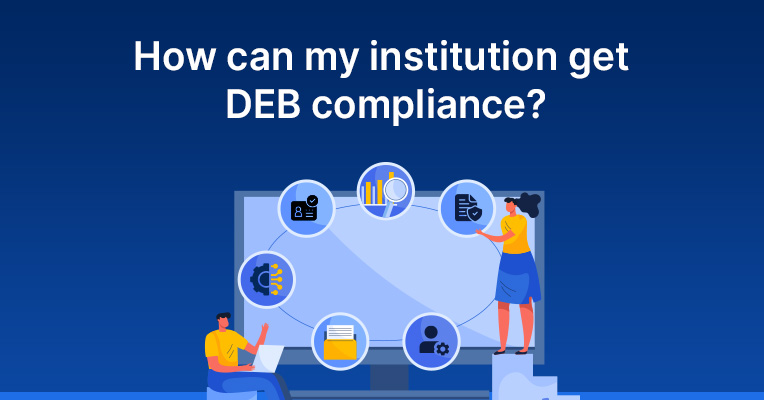In the higher educational landscape of India, distance education and open schooling have emerged as vital tools for expanding access to learning. Through the increased accessibility to internet and digital devices, online education and distance learning programs have provided flexibility and opportunity to millions of students who might otherwise be excluded due to geographical, financial, or time constraints.
Understanding distance education in India
Distance education in India allows students to pursue academic programs without being physically present on campus. Thus, making it possible for learners from remote areas, working professionals, or those with other commitments to continue their education.
However, with the rapid increase of such programs, ensuring their quality and authenticity becomes crucial. This is where DEB (Distance Education Bureau) compliance comes into play, a critical requirement for universities wishing to offer recognized distance education programs in India.
What is the Distance Education Bureau (DEB)?
The Distance Education Bureau (DEB) is a specialized body under the UGC, established to regulate the standards of open and distance learning (ODL) in India. Formed in 2012 to replace the Distance Education Council (DEC), the DEB’s primary objective is to ensure that the universities offering distance education programs maintain the quality and credibility expected of higher education institutions.
What is DEB compliance?
DEB compliance refers to the adherence to the guidelines and standards set by the Distance Education Bureau for universities offering distance education programs. To achieve DEB compliance, a university must meet specific criteria related to infrastructure, faculty qualifications, and the quality of education provided. Compliance ensures that the university’s programs are recognized and legitimate, protecting both the institution’s reputation and the students’ academic credentials.
Why has UGC made DEB compliance mandatory for institutions offering distance education programs?
The move to enforce DEB compliance by UGC addresses several critical factors. But achieving DEB compliance is not just about meeting regulatory requirements; it offers many key benefits to your institution as well:
- Legitimacy and recognition: DEB compliance validates the legitimacy of your institution’s distance education programs, enhancing your credibility and reputation.
- Quality assurance: Compliance ensures that your programs meet high academic and operational standards, which translates to better educational outcomes for students.
- Student confidence: Students are more likely to enroll in programs that are DEB-compliant, knowing they meet recognized quality standards and will be recognized by employers and other institutions.
- Access to funding and grants: Many funding agencies and grants require DEB compliance as a prerequisite. Compliance can open doors to financial support and resources.
- Regulatory alignment: Staying compliant helps avoid legal issues and penalties associated with non-compliance, protecting your institution from potential legal and operational challenges.
How can your institution get DEB compliance?
For institutions offering distance education programs, achieving DEB compliance is essential to operate legally and maintain academic standards. Here’s a step-by-step guide on how to get DEB compliance:
To achieve DEB (Distance Education Bureau) compliance for your institution, you need to follow specific steps as outlined by the University Grants Commission (UGC). Here’s a detailed guide:
- Understand DEB Regulations: DEB operates under the UGC’s “Open and Distance Learning (ODL) Programmes and Online Programmes Regulations.” These regulations set the framework for offering distance and online education in India. Familiarize yourself with the latest guidelines and amendments to ensure your institution meets the eligibility criteria.
- Eligibility Criteria: Universities must meet certain criteria to apply for DEB recognition:
- NAAC Accreditation: The institution should have a NAAC score of 3.26 or above.
- NIRF Ranking: Alternatively, the university should be ranked in the top 100 in the NIRF (National Institutional Ranking Framework) at least twice in the last three cycles. These criteria are crucial for institutions seeking to offer online and distance learning programs without prior UGC approval.
- Application Process
- Registration: The institution must register online through the DEB portal, where a unique ID and password will be provided.
- Submission: After registration, fill out the online application form, upload necessary documents, and submit it along with a notarized affidavit to the Joint Secretary (DEB) within ten working days.
- Application Fee: Pay the one-time registration fee and the fee for each program you’re applying for.
- Program Restrictions: Certain programs cannot be offered under ODL or online mode, including but not limited to Engineering, Medical, Law, Pharmacy, and Nursing. Ensure that the programs you intend to offer comply with these restrictions.
- Ongoing Compliance: Once recognized, institutions must adhere to the DEB regulations continuously, including the submission of annual reports, maintaining the required infrastructure, and ensuring the quality of education through internal quality assurance mechanisms.
- Staying updated: The DEB periodically updates its guidelines and regulations. Regularly check the DEB notices and stay informed about any changes that might affect your compliance status. By following these steps, your institution can achieve and maintain DEB compliance, ensuring that your distance education programs meet the necessary standards and provide quality education to students.
How can Meritto help?
Once you achieve DEB compliance, managing the ongoing administrative workload can become a challenge. This is where Meritto’s DEB-Compliant Admission Software can simplify and streamline the ongoing management for you.
It enables you to create DEB-compliant admission forms, ensures real-time verification of student DEB IDs, and automatically submits these IDs to the UGC for validation. This streamlined process guarantees that student admissions are valid and compliant, reducing administrative burdens and ensuring smooth operations.
Want to know more? Schedule a 30 minute call with our expert to explore how Meritto’s purpose-built solution can optimize your admission process and support your institution’s growth.




